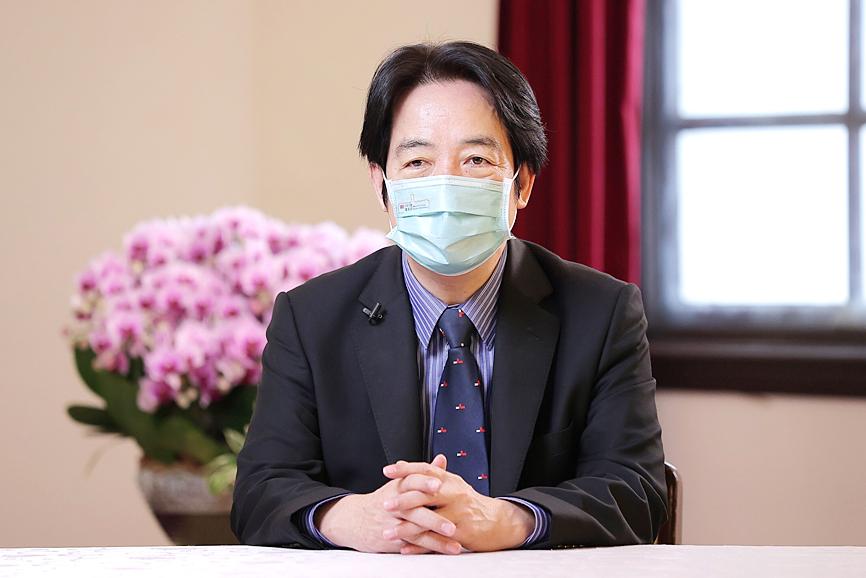Authorities should make use of technological advances in searching for missing elderly people, Vice President William Lai (賴清德) said in a video posted online on Saturday.
Lai’s video is to serve as the opening remarks for the 20th anniversary of the League of Welfare Improvement for Older People.
“I’d like to thank the league for the love it has shown in helping so many elderly people become reunited with their families,” he said.

Photo courtesy of the Presidential Office
Using technology to assist in searching for elderly people who get lost due to dementia or other health conditions is a pressing task, given that Taiwan is to become a super-aged society by 2025, he said.
In the past, families had to rely on filing missing person reports with the police, and posting ads in newspapers and on television to locate missing relatives, Lai said.
“Today, we have smart technology and other online tools at our disposal,” he said. “We need to adapt this technology now, because by 2025 one in five people in Taiwan will be over the age of 65.”
The aging of Taiwanese society combined with an increase in the number of people with dementia means that the number of missing person reports is also rising, he said.
Last year, 2,149 elderly people with dementia went missing, up by 608 reports in 2016, he said.
“What will be most important is not what the government tries on its own, but what the government does in cooperation with social welfare groups,” he said. “As an example, the league has provided families with solid support for 20 years.”
The government should invest in such organizations to improve the efficiency of its efforts, he said.

The Ministry of Education (MOE) is to launch a new program to encourage international students to stay in Taiwan and explore job opportunities here after graduation, Deputy Minister of Education Yeh Ping-cheng (葉丙成) said on Friday. The government would provide full scholarships for international students to further their studies for two years in Taiwan, so those who want to pursue a master’s degree can consider applying for the program, he said. The fields included are science, technology, engineering, mathematics, semiconductors and finance, Yeh added. The program, called “Intense 2+2,” would also assist international students who completed the two years of further studies in

Former president Tsai Ing-wen (蔡英文) departed for Europe on Friday night, with planned stops in Lithuania and Denmark. Tsai arrived at Taiwan Taoyuan International Airport on Friday night, but did not speak to reporters before departing. Tsai wrote on social media later that the purpose of the trip was to reaffirm the commitment of Taiwanese to working with democratic allies to promote regional security and stability, upholding freedom and democracy, and defending their homeland. She also expressed hope that through joint efforts, Taiwan and Europe would continue to be partners building up economic resilience on the global stage. The former president was to first

Taiwan will now have four additional national holidays after the Legislative Yuan passed an amendment today, which also made Labor Day a national holiday for all sectors. The Chinese Nationalist Party (KMT) and Taiwan People’s Party (TPP) used their majority in the Legislative Yuan to pass the amendment to the Act on Implementing Memorial Days and State Holidays (紀念日及節日實施辦法), which the parties jointly proposed, in its third and final reading today. The legislature passed the bill to amend the act, which is currently enforced administratively, raising it to the legal level. The new legislation recognizes Confucius’ birthday on Sept. 28, the

Former president Tsai Ing-wen (蔡英文) on Monday called for greater cooperation between Taiwan, Lithuania and the EU to counter threats to information security, including attacks on undersea cables and other critical infrastructure. In a speech at Vilnius University in the Lithuanian capital, Tsai highlighted recent incidents in which vital undersea cables — essential for cross-border data transmission — were severed in the Taiwan Strait and the Baltic Sea over the past year. Taiwanese authorities suspect Chinese sabotage in the incidents near Taiwan’s waters, while EU leaders have said Russia is the likely culprit behind similar breaches in the Baltic. “Taiwan and our European